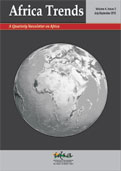Globalization of the Jihadist Threat: Case Study of Trinidad and Tobago
Despite a well-integrated Muslim population, and an environment where there is no tangible discrimination or lack of opportunity, the Jihadist ideology has succeeded in taking root in Trinidad. Links with organized crime have helped fuel the movement and strong links have been forged with ISIS and Al-Qaeda with the result that at least 89 Trinidadians are now in Syria. It is also argued that some Trinidadian Muslims have succumbed to the messages broadcast by ISIS and that the lure of fighting for an Islamic Caliphate has found resonance.
- Published: March 2017


















